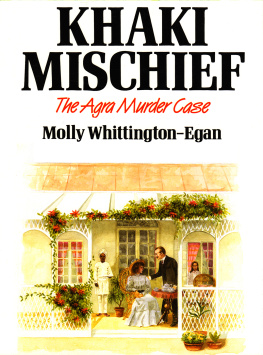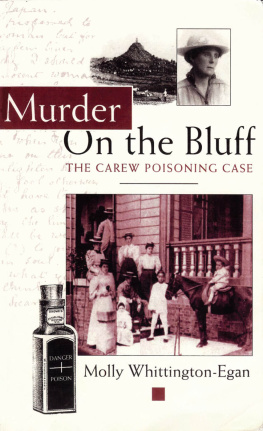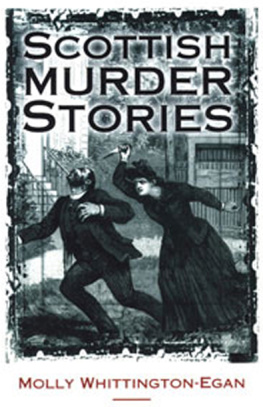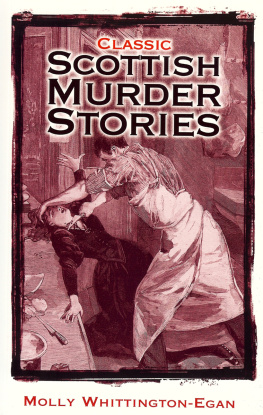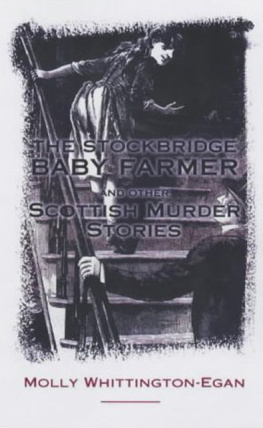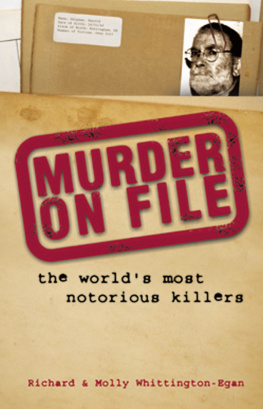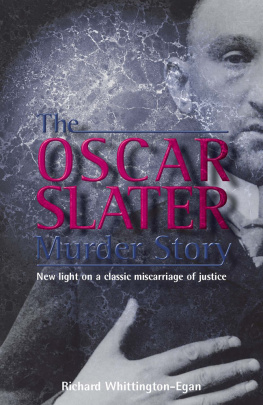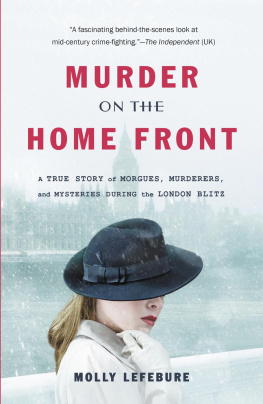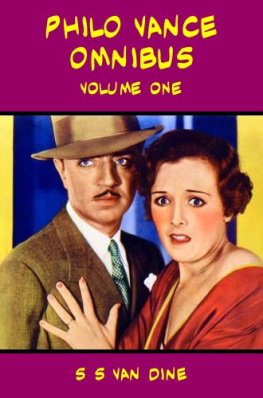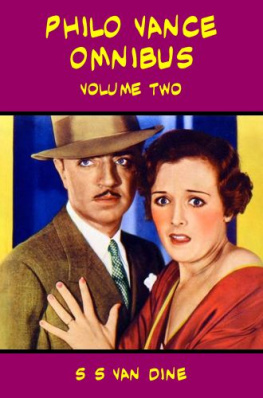KHAKI MISCHIEF
The Agra Murder Case
Molly Whittington-Egan
www.nwp.co.uk
For my mother and my husband
Acknowledgements
My gratitude to the family of the late Henry Hope, who have helped and encouraged me by the gift of the results of their research into their background, and by their interest and enthusiasm.
My gratitude to Jonathan Goodman, whose generous gift of an introduction to that family, after they had contacted him on reading his Posts-Mortem, so greatly enriched my own work.
Special thanks to Mary Neilson, Brigadier R. B. Scott, D.S.O., and David Ward, for conversations about British India.
I am indebted also to
Hilary Bailey;
I. A. Baxter, India Office Records, The British Library;
Annabel Carey;
Ealing Public Library, Mattock Lane;
The Editor, Standard Twentieth Century Dictionary: Urdu into English;
J. H. H. Gaute;
Paul Guy, British Library Document Supply Centre;
Malvern Library;
Jerry Mullaney, for photographic expertise;
Rajkeeya Public Library, Allahabad;
Records Branch, Department of Social Security, Newcastle;
Reverend Mother, Loreto House, Calcutta;
John Sinkins, Wildys, Lincolns Inn;
Alison West, Suffolk Record Office;
Christian Wright, National Library of Scotland;
D. Wyn Evans, The University Library, Exeter;
and to my husband, Richard Whittington-Egan, minence grise of matters criminous, whose experience, and library, were always at my disposal.
Contents
List of Illustrations
Plates
In text
Chapter One
The Pilots Daughter
It was a hot evening in Agra, and the little girl, aged nine, lay awake in the sweltering bungalow at 9 Metcalfe Road. Outside, in the compound, undergrowth rustled and shapes slithered, while the fever-bird called in a rising crescendo, Are you ill? Are you ill? Brain fever! Brain fever!
Kathleen was suspicious, and she was watching. Her father had been sickagainand had gone to bed. Through the open doorway of her bedroom, she had an oblique, partial view of the dining-room. Two grown-up figures were passing back and forth: her mother and her mothers friend, a doctor.
She saw the doctors hand take a red box from a shelf. Thenlet Kathleen speak; her voice is small and innocent, but precise, deadlyHe opened the box and brought out a glass needle and opened a paper which he also took from the shelf. He poured out some white powder in a wine-glass and poured some water in it. He put the needle into the glass and then pulled it up.
Nextand the witness who had been underestimated, discounted, could still see through the doorwayHe took the glass needle into my fathers room, and poked it into his heart and his arm and his shoulder. I thought it was a very cruel thing to do.
The doctor went back into the dining-room, and her father was left alone. After about a minute, he began to make a funny, gargling noise.
The little girl stole out of bed in her long, white nightdress and stood beside her father as he lay on his back, gargling, until he was quiet. But she did not know death when she saw it, even though she had lived all her short life in India, where death lurks in varied guise around any corner.
Back to her bed she crept, and kept watch. Presently, the doctor returned to the stilled man and felt his hand. It was only then, when he said one wordGonethat Kathleen understood. There was no sound of crying from her mother.
* *
Agra was a black time, but oncebefore Agra, before the doctor camethere had been bright, white days in Meerut, where, in 1908, when the drama begins, Edward and Augusta Fullam lived with their three children.
Meerut was a museum of bad memories for the British. Lest they should forget the Indian Mutiny of 1857, which began there during Sunday morning service, certain bungalows bore a plaque inscribed with the chilling message that Here Mrs Smith-Smith and her four children were killed and thrown down a well. Not surprisingly, some of these marked bungalows were reputed to be haunted. Sensitive English dogs howled and shunned them.
Buried not too deeply in the collective memory lay the nice detail that the Mrs Smith-Smiths had been ravished with batons of burning tow. On Sunday mornings, in weekly commemoration of a time of fatal British unpreparedness, troops filed into church equipped with their sidearms and rifles, and deposited them into special slots designed for that purpose.
None of these associations disturbed the Fullams, snug in their spacious bungalow at 33 Warwick Row. Augusta loved Meerut. Every day, Edward cycled off to his office and she was deliciously free to indulge in the trivial pursuits of the minor memsahib who was not burdened with a social conscience.
Augusta ran her household in the style that was expected of her. The entire story that follows is set against the listening, muttering background of white-robed native servants. Somehow, the bashful British managed to cope with the lack of privacyoften, as Mrs Montgomery in J. R. Ackerleys Hindoo Holiday would advise, by pretending that the Indians did not exist.
Shuffling, bare-footed figuresfar too many of themwhisked round comers unexpectedly and were fond of crouching on the back verandah, within hearing of the matrimonial bed. In some homes, during the dreaded Hot Weather, the man who pulled the string of the punkah fan suspended over the bed was stationed actually inside the bedroom.
Each separate bungalow, exposed and baking in its own compound, was as open as a film-set. The servants were linked by threads in the web of caste and kin to the shadow households of servants which backed up all the other British establishments. It was impossible to opt out of the grapevine of gossip, and anyone who chose to behave in a manner that would cause comment was obliged to balance the value of the indulgence against the consequences of its broadcasting.
The modest Fullam mnage, an unpretentious set-up, as befitted their social position, was quite imposing enough: bearer, cook, ayah for the children, gardener, water-carrier, part-time washerman, and lowly sweeper, who saw to the thunder-box. A syce tended the one horse kept to draw the light fitton, or phaeton, which was Augustas main form of transport. She was no rider; her heritage was far from that of the full-blown memsahib who rode to hounds, side-saddle, on jackal hunts, or set off on jungle safari. Mick was the family dog. It was the done thing to keep an English dog, especially a smooth-coated fox-terrier or a bull-terrier, even though the most cherished pet was very likely to catch rabies from some starved pye-dog.
India was not a bad way of life, as long as your health lasted. Wife and children of some classes could be packed off to the Hills for the worst of the Hot Weather, and the husband, if he were so placed, could join them for periods of leave.
But outside the whitewashed walls of the compound, the wild Plains were waiting to invade the watered lawns and the tubs of nostalgic country-garden flowers. Unless the vegetation was constantly cut back, deadly snakes, unseen, would boldly scale the verandah, lurk under rugs and cushions, and pop up through bathroom outlets.
The mysterious, pungent, jangling, scheming bazaar was never far away. Thuggee was over, but dacoits abounded. Death lay in a sunbeam, in a pink sweetmeator in a womans heart.

